

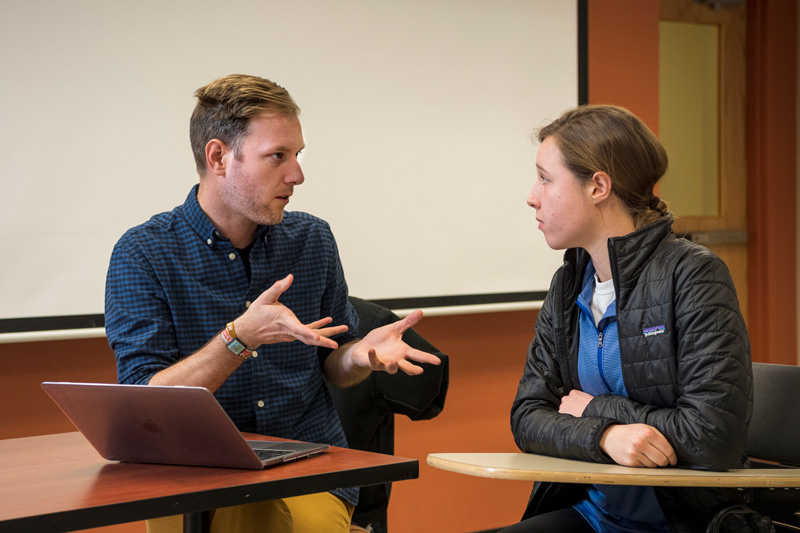
Writing your way to success
Photos by Kathy F. Atkinson February 14, 2019
Every UD undergraduate must take English 110 because writing well is an essential skill
The only course required for all undergraduate students at the University of Delaware is called Seminar in Composition or English 110. That is not an accident.
Writing well matters, whether one majors in physics or philosophy, and whatever one chooses to do in life, which is why it is required. English 110 is more than your typical writing class, said Christine Cucciarre, director of composition.
“This class is foundational to a UD education,” she said.
The goal of English 110 is to help students write clearly, think critically about who they are writing for, learn research skills and how to give and take feedback on their writing. This happens by working on multiple drafts, working closely with professors in classes capped at 22 students and strengthening research skills.
In the end, students are better equipped to write for the remainder of college and into their chosen careers. Research shows strong writing is one of the top skills employers look for when hiring.
More than 4,500 students in about 220 sections took the class during the 2017-18 academic year. According to research by the Blue Hen Success Collaborative, success in English 110 is directly correlated to graduating on time.
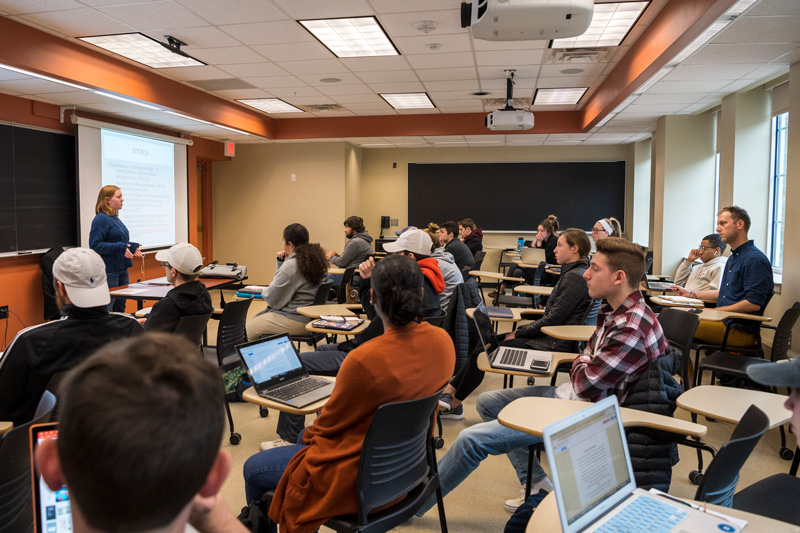
“We know the class is important to retention,” Cucciarre said. “It’s important to how students think about being a student. It’s so much more than just about writing because we really tout writing as a way of discovery and learning.”
Ideally, students take the course in their first year, but there are some exceptions like students who transfer from other universities. There’s a lot of misconceptions around what makes good college writing, Cucciarre said, so it's best to help students get over that earlier.
“Half of our work in English 110 is to get students confident in their writing ability again,” she said. “I have a lot of my students who come in and are so afraid of writing because they’ve been pushed into silence their whole lives.”
One of the biggest myths the department has to work through is the notion that English 110 is just another box to check.
“It actually is an opportunity for connection with professors and for students to focus on skills that compliment all of the other skills that they will be developing while they’re here at UD,” said Délice Williams, associate director of composition. “I wish more students would come to 110 with a sense of expectation about what this course can help them do.”
While there are overarching course goals and practices, instructors have the freedom to structure their own classes. Williams’ fall 2018 class had a Hamilton, the musical, theme. For one assignment, her students created a new intro for the play by adding relevant historical context to enhance the story.
Problems and solutions
Most classes do not have specific themes. Dustin Morris, a postdoctoral researcher in the composition program, had his students look at problems and write about solutions for their essays. Part of school - and perhaps the rest of life - is learning to write well for varying audiences and occasions, even if the subject is not the writer’s favorite topic. That said, Morris gives his students the freedom to pick a subject of interest or topic related to their majors.
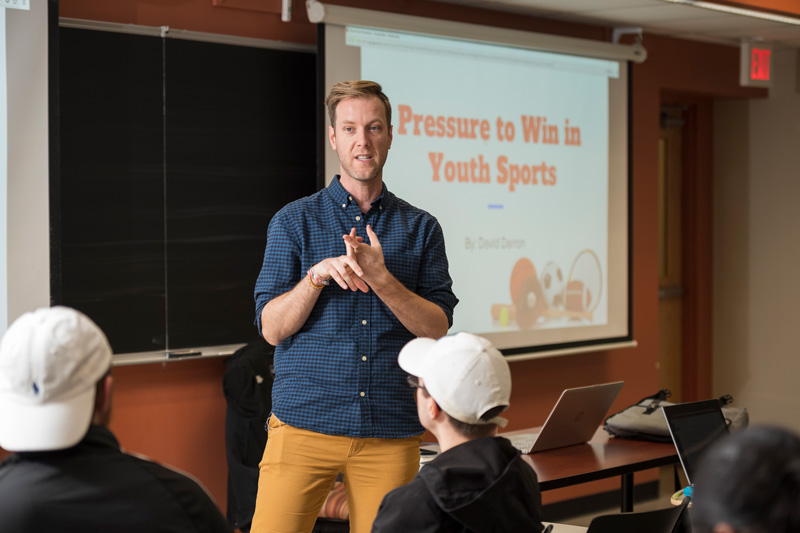
“That’s exciting to me because if they are interested then I’m interested,” Morris said.
He chose to structure his class this way because it really emphasizes one of the key skills of the class: understanding audience.
“Every writing task is situated based upon who you are writing for, what you are writing on and who you are,” Morris said. “So getting my students to see that there’s not one static writing situation is my goal as well as the composition program’s goal.”
Near the end of the fall semester, Morris’ students presented on a wide range of solutions including more ethical means for slaughtering animals, why bitcoin is not real and how to get young girls interested in STEM.
Researching a topic, crafting an argument and working closely on drafts has made a difference in the eyes of Morris and his students.
Amy Lineberger, a first-year student studying mechanical engineering, said she was a little nervous when she started the class because writing is not her strong suit, but she has come to enjoy it.
“I love how professor Morris teaches,” she said. “It's really opened my eyes to how to write and research things more than I have ever before.”
Chet Hoober, another first-year student studying mechanical engineering, said the work he’s done in English 110 has translated to some of his engineering courses.
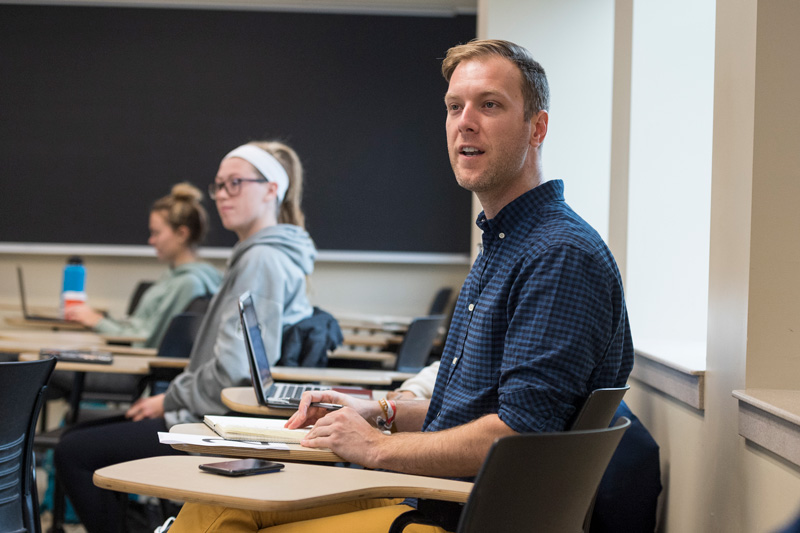
“My general engineering class is probably where it’s helped me the most,” Hoober said. “We have to do reports on different things and actually write out stuff rather than in my math and my chemistry classes where I don’t have to write typically anything.”
There were also two juniors in Morris’ class who still found English 110 to be helpful, even though they’ve completed a good chunk of their college careers.
“It’s actually made me better just realizing that there are different forms of writing rather than a research paper,” said Matt DeLuca, who is studying communication with a concentration in mass media. “I feel like my writing has gotten better throughout the semester.”
Kate O’Donnell, a junior studying communication with a minor in French, said she was already pretty comfortable with writing, but learned a lot about researching and available library resources at UD.
“I had to write quite a few papers for my composition class and I think that did help because those were papers that were a little bit more research based,” O’Donnell said. “I had to go into databases and look at modern takes on theories that have been around since the ‘60s and ‘70s.”
Morris said the key to success in English 110 boils down to putting in the necessary work. He encourages his students to write daily and really engage with the revision process.
Showcase your work
Each year, essays written in English 110 can be nominated or self-submitted for the Arak award, established by Ruth Toor and Sydney Arak in honor of their parents John and Frieda Arak. The winning essays are published in the Arak Journal.
Williams oversees the publication team, which includes student editors and illustrators. She said it’s a great way to showcase student work.
“It’s a celebration of first-year writing,” Williams said. “It’s a chance for us to say look at the awesome work our UD students are doing. Many of our instructors use Arak essays in class as models, so it celebratory on one hand and on the other hand there is a classroom use dimension.”
One of her favorite essays featured in the 2016 edition, was one by Ryan McNulty titled, "Development of The Modern Day Pitcher: A Risk vs. Reward Analysis of the era of Flamethrowers." McNulty takes readers through the history and rise of the fastball, but reflects on the damage its doing to baseball players in the process.
There’s a stigma that certain topics aren’t “academic,” and this shatters it, Williams said.
“It makes the research essay seem enjoyable and interesting to read,” she said. “It’s because it focuses on a topic that some people might not think of as serious or academic. It shows you can give a really serious and lively and interesting treatment of a topic.”
Another work she highlighted was an essay in the 2017 journal titled "A Greater Price to Pay: Poverty and Food Insecurity," by Patrick Reyes.
The Arak Journal reinstates the lessons all instructors want their students to take away, Williams said.
“I think it helps to make good work seem more possible,” Williams said. “It’s one thing to say let’s read something by a professional writer, but it's a different thing to say let’s read something by somebody in your dorm.”
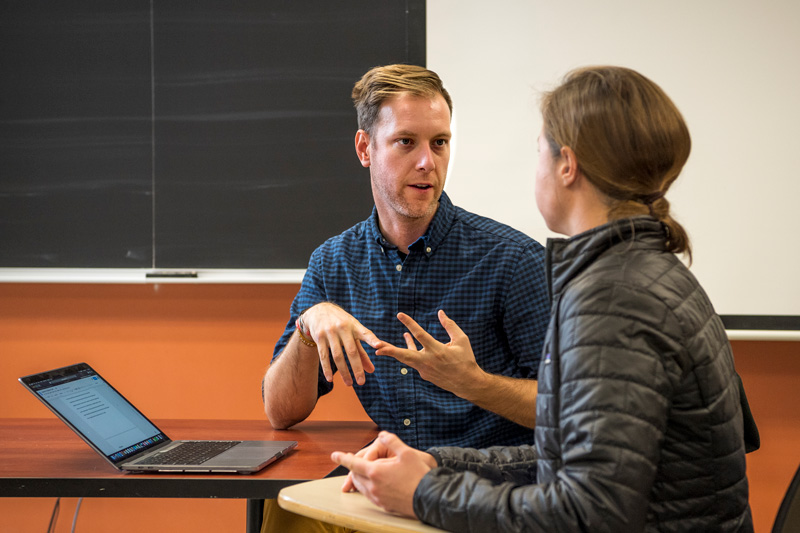
Contact Us
Have a UDaily story idea?
Contact us at ocm@udel.edu
Members of the press
Contact us at mediarelations@udel.edu or visit the Media Relations website

